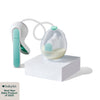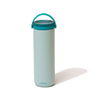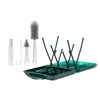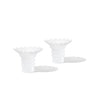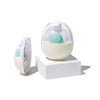Your days need support when you’re managing a newborn, sleep deprivation, and lots of responsibilities. These strategies will help.
Your days aren’t quite the same, now that you’ve got a newborn. Suddenly, your job description has become longer, your workload is exponentially heavier…and sleep? Well, you’re definitely not getting enough. There’s an incredible amount for you (and potentially your partner) to manage during the daytime, and you’ll need strategies to work through it. It’s a new world.
Dealing with daytime exhaustion (and chores) means employing some preventive tactics based on maximizing rest, refueling your energy, and coping with sleep deprivation. It’s a key parenthood challenge, and it’s not permanent.
Planning for the night
It might feel strange to think about sleep during the day (other than wistfully), but your daytime activities—including getting some restorative rest—can set you up for better sleep at night.
Babies often wake up before you feel ready for them to wake up. This is enough to put any parent on edge. How do you cope when you’re already feeling overwhelmed and exhausted? As perinatal psychiatric nurse practitioner Chris Raines says, motherhood is a full-time job. You aren’t expected to work without breaks, however, and those breaks require rest.
Finding the time to rest can be challenging in the early days, but these strategies can help you learn ways to recharge.
- Schedule time for yourself. Getting some down time could be as simple as taking an extra-long shower or bath. If you have a little more time (and baby coverage), you could try a self-connecting activity such as taking a walk, journaling, or crafting.
- Experiment with how you self-soothe. This may seem counterintuitive, but you can prioritize rest by finding moments of decompression, whether lying down to rest, listening to music, or even—yes—scrolling through feeds on your phone to check on the rest of the world.
- Refuel with water and protein. Hydration and nutrition are key to maintaining healthy systems and energy levels. If you’re drinking enough water, your urine will be a light yellow. And if you’re consuming enough protein, you will have stable blood sugar levels and better energy reserves to get you through sleep-deprived days. So snack if you need to—and keep reaching for (and refilling) your water bottle!
- Rest while your baby sleeps. It’s tempting to want to squeeze in another load of laundry or sinkful of dishes. But make a rule for yourself that you’ll rest, if you can, while your baby is sleeping. Sleep is great, but rest in and of itself is restorative.
- Avoid sensory overstimulation. Research shows that lying down with your eyes closed for 20 to 30 minutes in a dark space can be as beneficial as sleep—and can give your brain cells, muscles, and organs a break, reducing stress and improving mood, alertness, and creativity. (This is often referred to as “quiet wakefulness.”)
Better sleep at night starts with daytime activities, breaks, protein-based snacks, and hydration. You can use the pneumonic device GPS (Get outside, eat Protein, get Sleep) as your compass.
Coping with sleep deprivation
You might have had stellar sleep hygiene before kids. Well, sleep is among many important—and often routine—things up for renegotiation after the baby arrives. You’ll likely be battling a combination of exhaustion and adrenaline—and feeling overwhelmed to the core. Getting through this period requires a new daytime mind-set. You’ll need to lower your expectations in lieu of a gentler, less exacting approach to your daily living. Doula and midwife assistant Emily Varnam shares her insights and expertise about how to manage sleep deprivation.
LEARN HOW TO COPE WITH SLEEP DEPRIVATION
Troubleshooting the daily workload
It may already be clear to you that moms typically do the lion’s share of the baby-related labor. If you have a partner or other help, family or employed, it’s smart to think about how to distribute the workload. Ideally, you and your partner figure out an equitable split. The sooner you start these conversations, the better—but it’s never too late to start!
Managing infant naps
Your baby is going to sleep a whole lot during the day—more than perhaps you might have realized. (So. Many. Naps.) Although you’ll often be home for naps, your baby may also fall asleep in the car, in the stroller, or in the baby carrier while you’re out and about. This scenario becomes more likely as you have more children; the baby often needs to go where you all go! Here you’ll find tips to optimize your newborn’s sleep—and help you and your family get through this challenging period more smoothly.
Let’s say you need to be hands-free to run an errand or get something done in the house, yet your baby could use a cuddle and a nap. This is a good time to strap on the baby carrier or sling. Or better yet: Strap it on to your partner or caregiver. Babywearing is a lovely way to share the load—your infant—with others while addressing your needs.
As Dr. Laurie Jones, a pediatrician and founder of Dr. MILK (Mothers Interested in Lactation Knowledge), says, babies typically give nonverbal cues, such as hand-to-mouth movements to indicate hunger, before beginning to cry. And when your baby is nuzzled against your chest in a carrier, you can feel—and even address—these cues more quickly than when your baby is sitting in a car seat, stroller, or swing.
"Babywearing allows early recognition of hunger cues before babies start crying, and the infant has their thirst and comfort needs met sooner," Dr. Jones says
Calling in community support
The day-to-day workload, from meal prep to laundry to diaper changes to dishes, is a lot to juggle. There are many ways to rally some extra support from your partner, friends, family, and community to keep things moving along during the day.
Research indicates that support (both emotional and practical) is crucial to postpartum physical and mental recovery. This includes support in getting an adequate amount of sleep. And the more specific your requests for support, the better, Dr. Jones says.
Perinatal psychiatric nurse practitioner Chris Raines advises soliciting a steady stream of help.
"Who is your one person outside of you and your partner that you feel comfortable asking them to do stuff?” Raines asks. Ask this person, she says, to help coordinate a plan (perhaps using a site like Give inKind), to have friends and family drop off prepared meals, walk your dog, run errands, play with your older child, or even just pop in for a glass of wine during your early postpartum months.
Perhaps, Raines says, you’ll end up with a simple plan “where somebody's coming every other day for an hour or even two hours in the afternoon, just to sit and talk.” This alone could prove helpful.
Conversely, you may be wondering about how to respond to an abundance of requests to visit from well-meaning friends and family. Letting others meet and hold your baby is fine, if you have the energy for it, but you may need to create some rules and boundaries around access to your baby, especially regarding sleep—both yours and theirs. Friends and family who are willing to take on other tasks so either you or your baby can rest are golden during this time.
Get help with family social engagement
Enlist your partner or older child to be the house concierge. Writing thank-you notes for gifts that are given. Making the baby announcement. Taking the photos for the baby announcement, posting stuff on social media. Returning phone calls and emails, fielding requests to visit, keeping a schedule of visitors. House concierge! Staying connected socially is a burden and a gift of modern parenting. Enlist help to make you feel competent as a parent.
Have more questions about navigating sleep postpartum?
Follow us @willowpump on Instagram, visit our blog and subscribe to our YouTube channel for more tips and expert-backed guidance.
Tags Used


